
In the Eur-Seree Collecting Auction 56, there was a section of banknotes with solid and lucky numbers. The interest for these banknotes has really taken off during in the last few years. Some years ago, during an exhibit, the Bank of Thailand arranged a lottery and auction for charity. The bank had picked out banknotes with solid and lucky numbers. The more interesting banknotes were auctioned off, while for the other notes, tickets could be bought for 2,000 Baht for the lucky draw. The ones who bought banknotes in this auction and those participating in the lucky draw had a lucky day compared with the prices in the Eur-Seree auction.
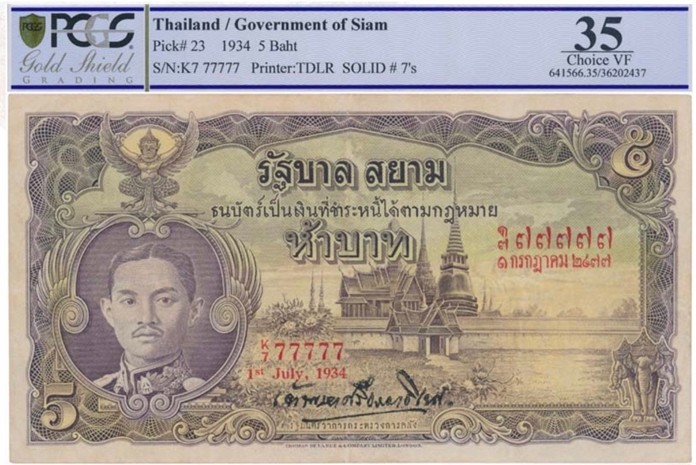
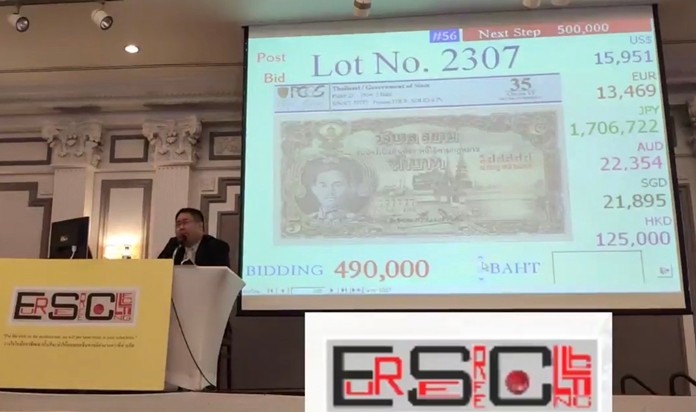
The most expensive solid and lucky banknotes sold for 490,000 Baht and had a starting price of 380,000 Baht. It was a 5 Baht Second Series Type II dated 1st July 1934 during the reign of King Prajadhipok, Rama VII.
The banknote has the super solid prefix and number K/7 77777. Banknotes with the same number as the number of the reigning King draw the most interest amongst collectors and dealers.
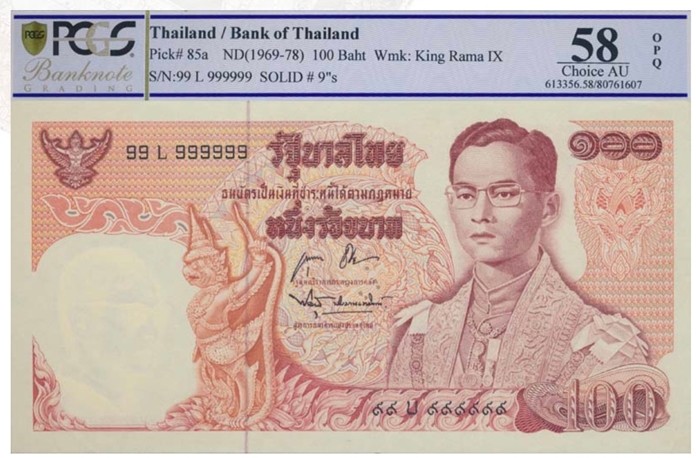
A 100 Baht banknote, series XI, with the super solid prefix and number 99/L 999999 had a starting price of 180,000 Baht. Several bidders were interested and the buyer had to pay 410,000 Baht for this note issued during the reign of King Bhumibol, Rama IX. The very same note was sold in Eurseree auction 51 on 1st December 2018 for Baht 350,000.
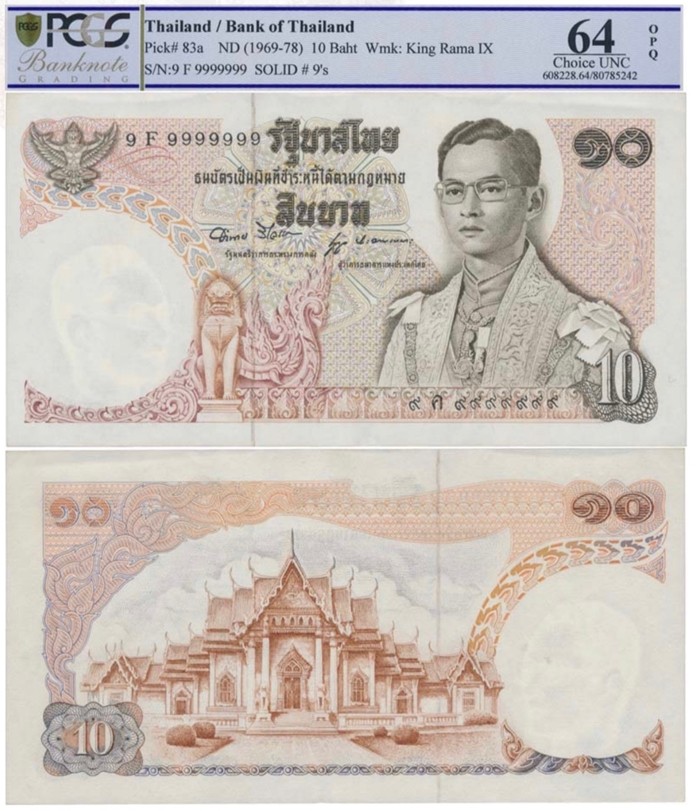
Some of us remember using the 10 Baht banknotes. A 10 Baht Series XI, announced June 18, 1969, had the super solid prefix and number 9/F 9999999. The starting price was 135,000 Baht and with many bidders involved, it was knocked down at Baht 300,000.
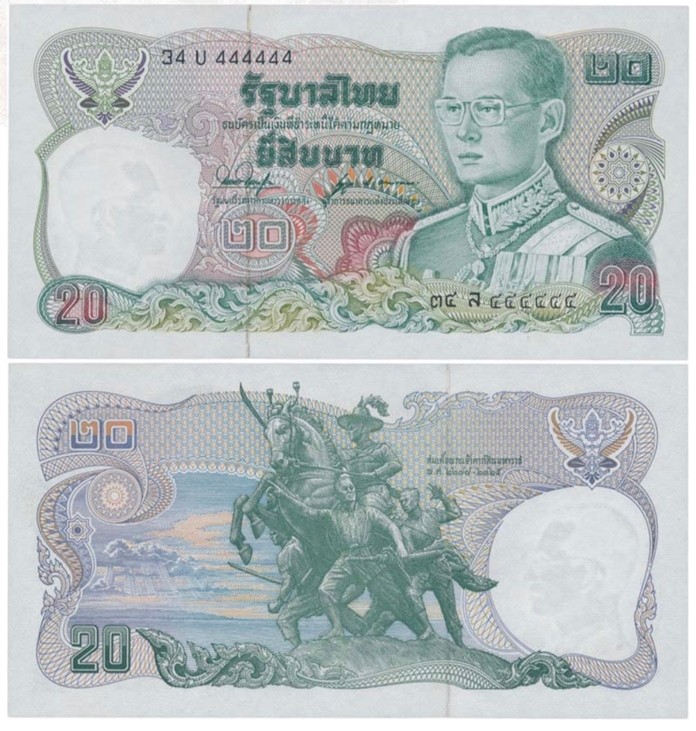
So far, I have mentioned some of the most expensive notes. But several of the banknotes with solid and lucky numbers were sold for less than 10,000 Baht. For example, the starting price for a 20 Baht, Series 12 banknote in uncirculated condition with the prefix 34/U and solid number 444444 was 5,000 Baht with the winner bidder paying 6,400 Baht.
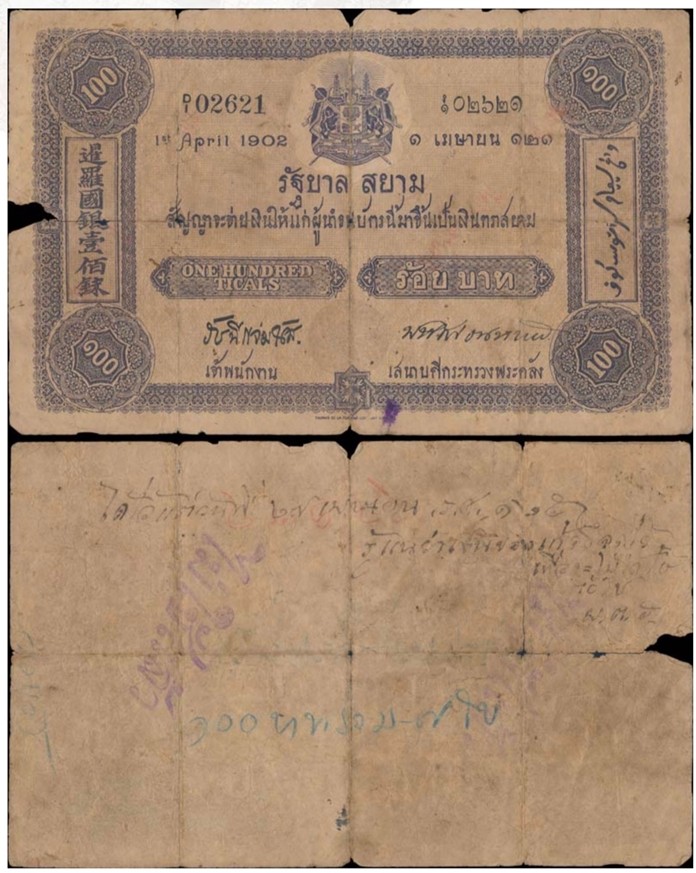
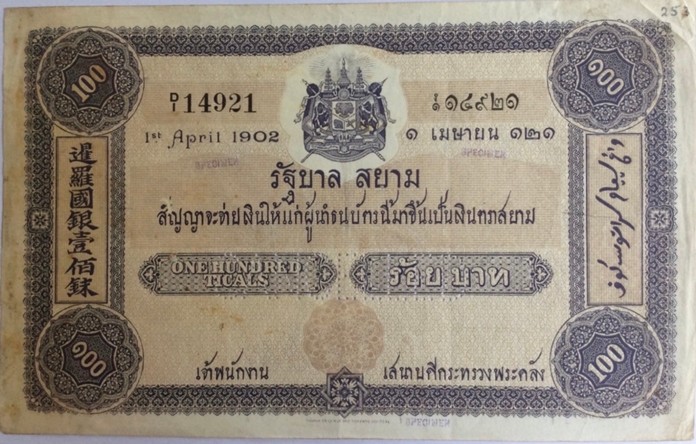
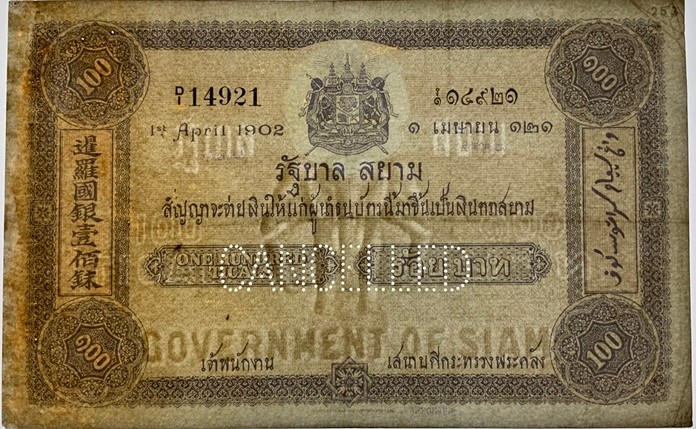
A very rare Hundred Baht banknote First Series Type I dated 1st April 1902 was set at 10,000 Baht, but the buyer ended up paying 74,000 Baht. The condition was described as Very Good, minor margin torn away as usual, split at folding and graffiti. This note is not beautiful, but very interesting. On the back of the banknote it is a pencil notion saying, “ได้ไว้ แต่วันที่ 27 เมษายน ร.ศ.๑๒๕ รู้แน่ว่า เป็นของเก้ จึงจกไว้เพื่อไม่ให้ใช้ต่อไป”. The translation is “Got since April 27, R.E. 125. This note is surely fake, therefore keeping it so that it won’t continue to be used anymore.”
Can it be a contemporary fake? As I have not seen the banknote, only seen the picture in the catalogue and on the net, it is difficult to make a judgement. In my collection I do have a specimen note from the archives of the producer Thomas de la Rue & Company Limited London. It would be interesting to compare. As it might be a contemporary fake, the watermarked paper can give some indications. At the time it was very difficult to produce perfect watermarked paper. Anyway, a contemporary fake is also interesting for a collector and could even be included in a museum.
It would be interesting to know the story about this banknote and where it was printed. If genuine, then it must have been printed in London, shipped to the Ministry of Royal Finance in Bangkok. The signatures were then printed on the banknotes here. But if it is a fake, it would be interesting to know who the producers were and if they were caught. Actually, they could be considered as artists, but unfortunately using their talent for illegal activities which could result in heavy punishment.
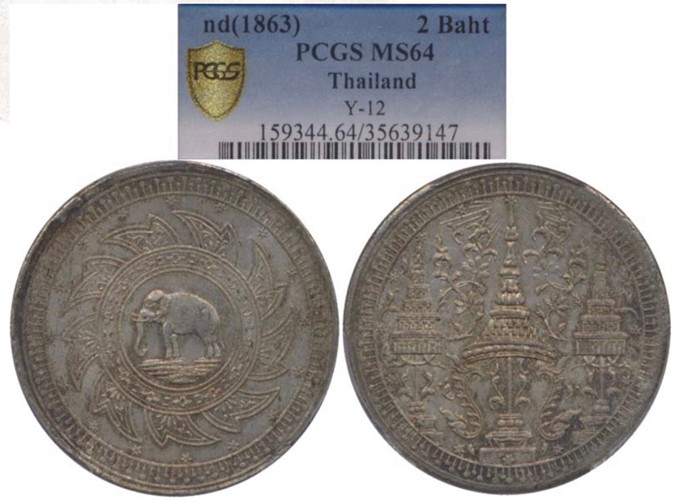
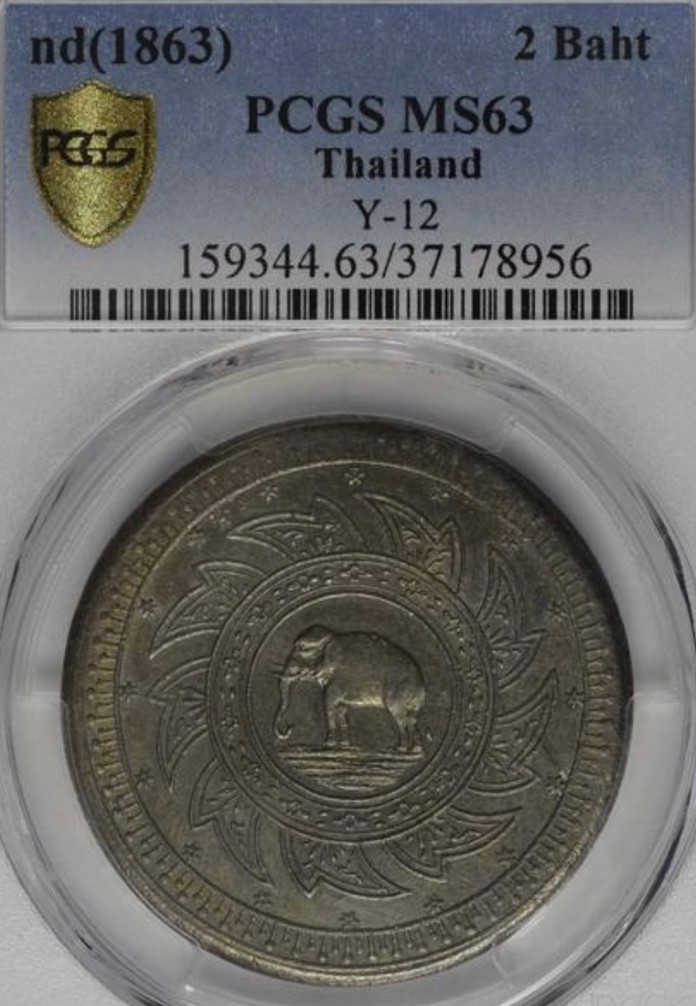
A beautiful 2 Baht ND (1863) Mongkut – Elephant graded by PCGS to be MS64, a very high grade for this coin, struck during the reign of King Mongkut, Rama IV, was auctioned. The starting price was 150,000 Baht and it sold for 220,000 Baht. This was a very good buy comparing with the one sold in May by Stacks in Hong Kong for US$ 9,300 graded by PCGS to be MS63. In the Hong Kong sale, Stacks sold five of this popular coin depending on grade for US$ US 2,200 to US$ 14,400.
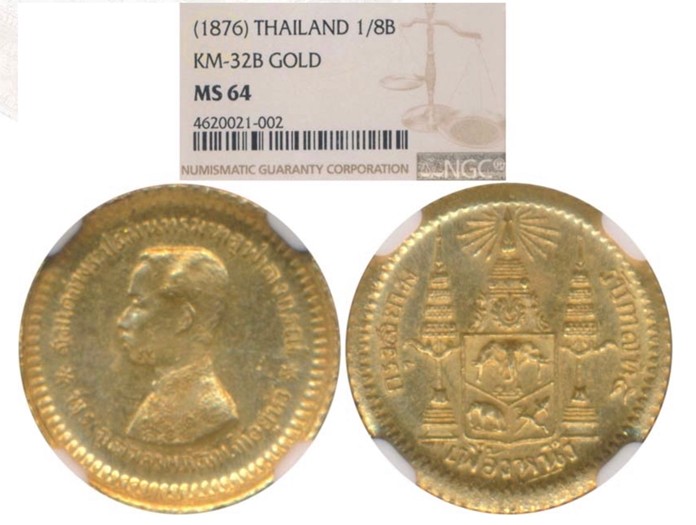
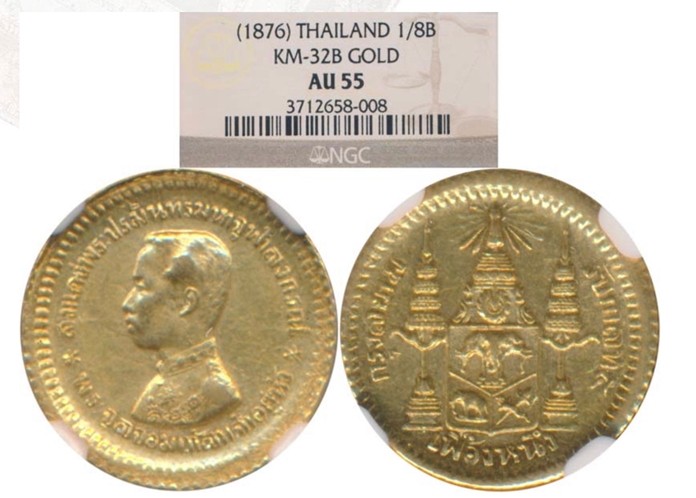
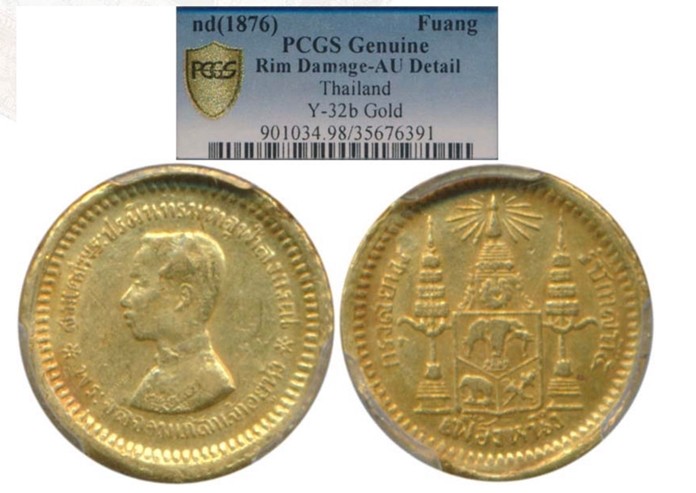
Nowadays, coins, medals and banknotes are often sent to third grading companies to be graded. The best grade is 70 and the worst grade is 1. So far, I have never seen anything graded at 1, but I have seen objects graded as low as 3. They are not so nice looking, but graded because of the rarity and to get a guarantee that the object is authentic.
In the auction, there were three small gold coins, the Fuang, 1/8 Baht struck during the reign of King Chulalongkorn, Rama V. The obverse of the coin has an image of the portrait of the King and on the reverse the Coat of Arms. They were all graded. The first was graded by NGC, Numismatic Guaranty Corporation to be MS64, with a starting price of 170,000 Baht and sold for 240,000 Baht. The second was also graded by NGC to be AU55 and had a starting price of 100,000 Baht, but with no one bidding higher was sold for that price. The third was graded by PCGS, Professional Coin Grading Services, to be Rim Damaged, but AU detail. The starting price was 30,000 Baht and it sold for 47,000 Baht. Probably if they were sold “raw,” not graded, the price difference wouldn’t have been that much.
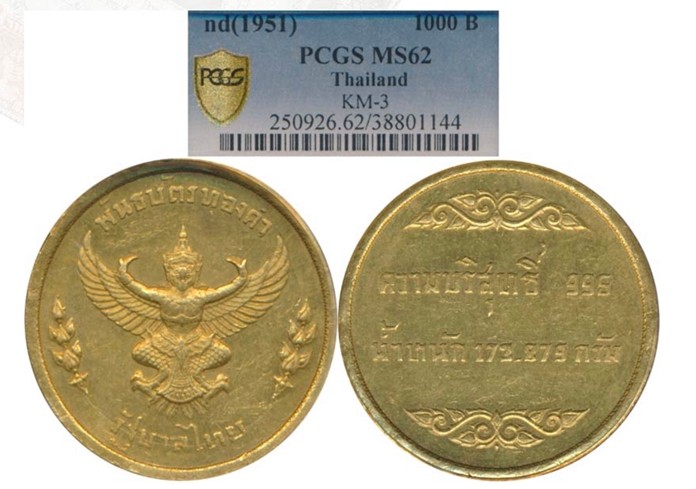 The price of gold has gone up 25% in the past year but this does not reflect on collectors gold coins. In the Eur-Seree auction conducted on 21 June 2020, a 1951 1000 Baht Government Gold Bond weighing 173.89 grams in Uncirculated condition had a starting price of 640,000 baht and was sold for 900,000 Baht.
The price of gold has gone up 25% in the past year but this does not reflect on collectors gold coins. In the Eur-Seree auction conducted on 21 June 2020, a 1951 1000 Baht Government Gold Bond weighing 173.89 grams in Uncirculated condition had a starting price of 640,000 baht and was sold for 900,000 Baht.
At this auction, another 1,000 Baht Government Gold Bond weighing 172.279 grams was sold. Graded by PCGS to be MS62, it also had a starting price of 640,000 and sold for 820,000 Baht.
For me, this coin looked nicer than the one sold in June. Though the price of gold is higher, it does not influence the price as the gold value for this interesting coin is around Baht 300,000. The probable reason that it did not fetch a higher price was that the person who bought the last one did not bid for this one.
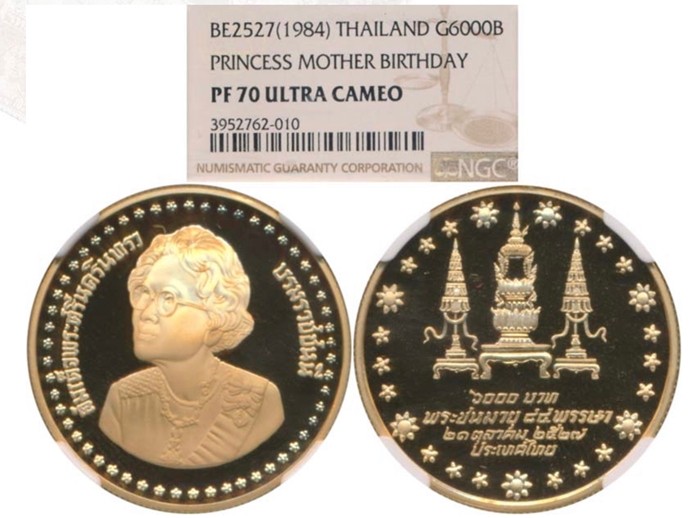
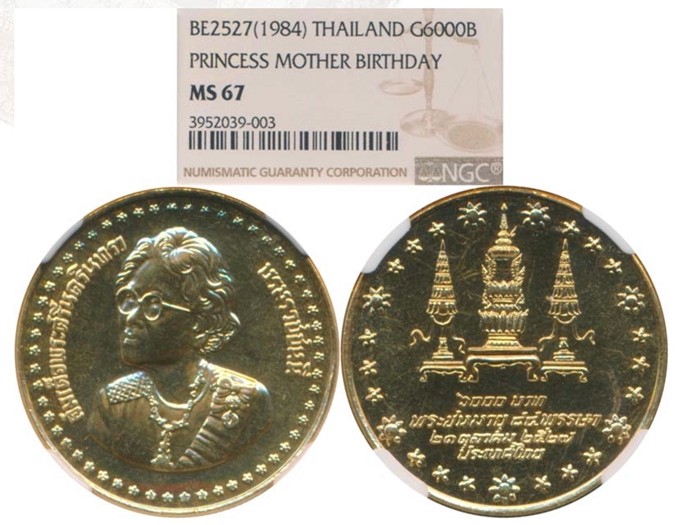
A rare and very popular coin is the 6000 Baht gold 1984 commemorating the 84th Birthday of King’s Mother. There was one coin in proof in the auction, mintage 264 pcs., graded to be in perfect condition with a starting price of 100,000 Baht, it sold for Baht 350,000. The same coin in UNC condition, mintage 835 pcs. graded by NGC to be MS67 had a starting price of 70,000 Baht, sold for 78,000 Baht.
The section of solid and lucky numbers featured 143 lots with 17 unsold lots. The total starting price was 5,511,100 Baht and sold for a total of 9,811,600 Baht. This means sales were 78% more than the starting prices.
In the section of Graded Coins & Medals there were 333 lots with 87 unsold lots. They sold for 16,889,300 Baht, 27% more than the starting prices.
380 registered for bidding and about 30 of them were new bidders for Eur-Seree auctions. At the 2-day auction, 305 successful bidders paid a total of 57,297,100 Baht for the prized items.
The pandemic does not seem to affect most keen numismatists who have more time to go through their collection during the ‘stay at home’ period. The market for the graded coins and banknotes is still as popular as ever, which is reflected in the value and higher bids for similar items. The market is very healthy, especially on the better and premium items, showing a jump of 400-500% on the same items during the past 5-6 years.
For prices realised go to www.eurseree.com
 |
 |
 |





